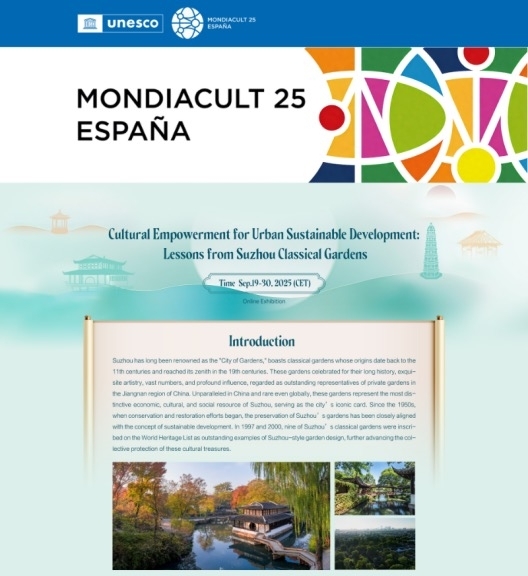| Suzhou Gardens Conservation Practices Featured at UNESCO MONDIACULT 2025 Online Side Event — Chinese Wisdom Contributes Solutions for Global Cultural Sustainability |
| PublishDate:2025-10-11 Hits:2675 |
From September 19 to 30, the online exhibition "Cultural Empowerment for Urban Sustainable Development: Lessons from Suzhou Classical Gardens," organized by the World Heritage Institute of Training and Research for the Asia-Pacific Region under the auspices of UNESCO (Suzhou Centre), was launched, showcasing China's achievements in the living inheritance of classical gardens and presenting the "Suzhou Approach" for global cultural heritage conservation and sustainable urban development. (Visit the exhibition at: https://www.sinowh.org.cn/zt/whfn/)
 As World Heritage sites, Suzhou Gardens exemplify Oriental aesthetics and serve as a vivid model of culture-driven sustainable urban development. Since the launch of rescue conservation efforts in the 1950s, Suzhou's garden preservation has evolved through four stages: individual restoration, holistic conservation of the ancient city, preventive monitoring, and group-based living inheritance. This has established a comprehensive protection framework encompassing "policy support, technological empowerment, community engagement, and industrial integration." By 2025, 108 gardens in the city had been included in the Suzhou Gardens List. Through a "free access + reservation-based sharing" mechanism, these gardens now benefit over 30 million residents and tourists annually, achieving a transition from "conservation" to "sharing" of cultural heritage. Suzhou Gardens have achieved remarkable results in community participation, public cultural benefits, digital dissemination, public education, and economic promotion. Addressing the conference's focus on climate action, Suzhou's "Garden City" initiative integrates garden design wisdom into urban planning, linking gardens with urban ecological corridors to mitigate the heat island effect and improve living environment quality. This fusion of traditional ecological wisdom and modern technology offers a low-cost, replicable solution for alleviating urban heat island effects and protecting biodiversity worldwide. This event marks another occasion for Suzhou's garden conservation practices to be showcased on the UNESCO stage. Since its inscription on the World Heritage List in 1997, Suzhou has adhered to the principle of "conservation first, revitalization through utilization," earning accolades such as the "Asian Urban Landscape Award" and the "UNESCO Asia-Pacific Heritage Conservation Award of Excellence." In the future, Suzhou will continue to advance its "Garden City" initiative, enabling these millennia-old gardens to demonstrate greater global value in the new era. As advocated by the MONDIACULT 2025 theme, Suzhou's garden conservation practices exemplify how "small but beautiful" Oriental wisdom contributes actionable and replicable Chinese experiences to global cultural heritage protection and urban sustainable development. These classical gardens thus serve as a cultural bridge connecting tradition and the future, China and the world. Background The UNESCO World Conference on Cultural Policies and Sustainable Development (MONDIACULT 2025) was held from September 29 to October 1 at the International Convention Center of Barcelona (CCIB), Spain. This three-day intergovernmental conference, convened by UNESCO under the MONDIACULT 2022 Declaration, will be held every four years starting in 2025.
entrance to exhibition: https://www.sinowh.org.cn/zt/whfn/ |
- Lecture: Preventive Archeology
- New Year Message | UNESCO World Heritage Centre for Training and Research in the Asia and Pacific Region (Shanghai) Extends to You Its Sincere New Year Wishes!
- Review | Cooperation between Xiamen, CNR and WHITR-AP Shanghai
- Review | Yunlong International Workshop on Vernacular Heritage
- Review | The Heritage Educational Landscape Exhibition
- Review | UHC-HEI 1st General Assembly
Copyright © 2009-2012 World Heritage Institute of Training and Research-Asia and Pacific (shanghai)


